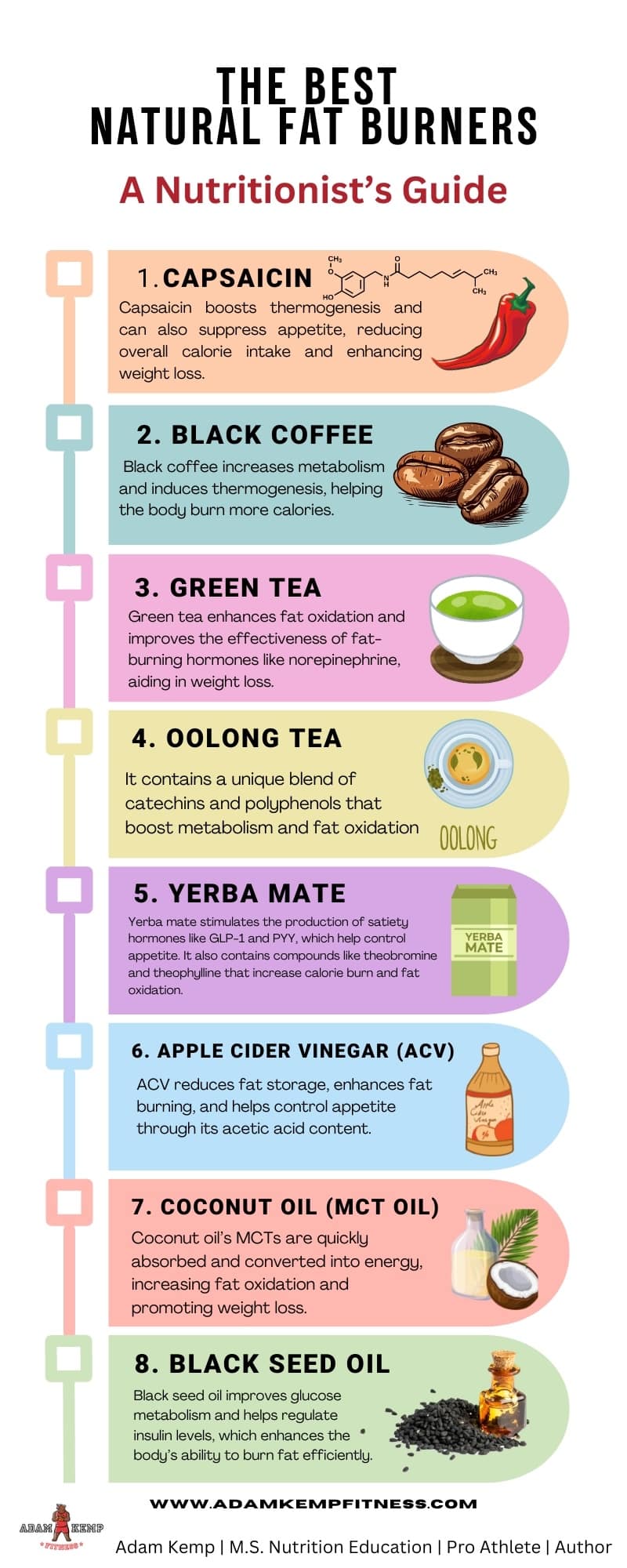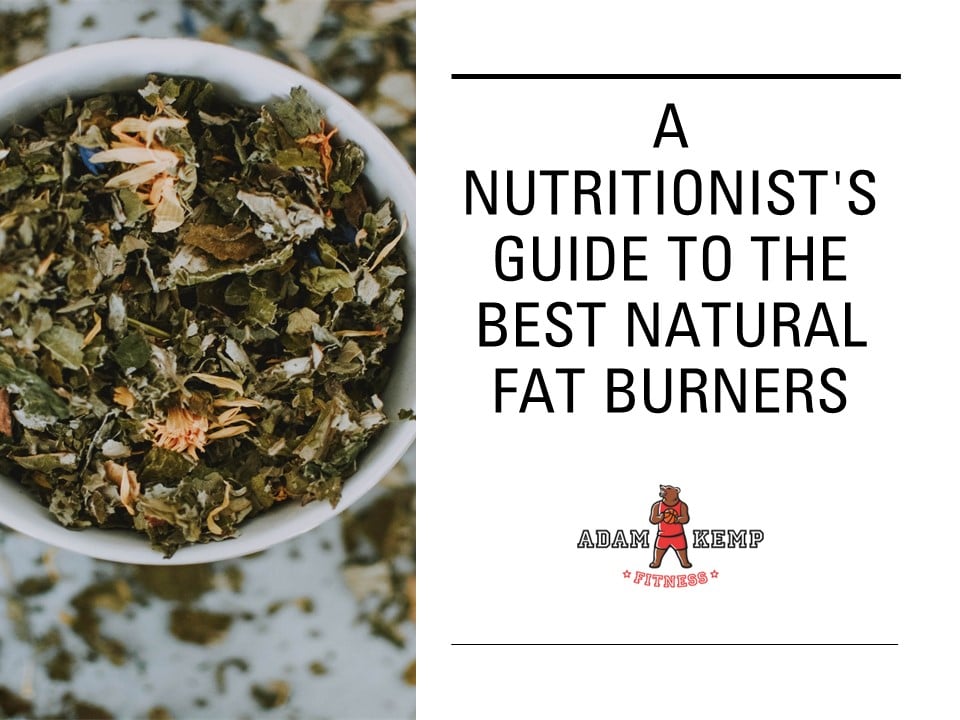A Nutritionist’s Guide to the Best Natural Fat Burners
Natural fat burners, made from herbs, spices, and other plant-based ingredients, offer a promising alternative for those seeking to enhance their weight loss efforts.
Although many proposed “fat burners” do very little to support weight loss, some natural fat-burning ingredients can significantly boost weight loss.
In an era when the market is flooded with weight loss supplements making lofty promises, it’s essential to distinguish between hype and scientifically backed solutions.
These ingredients not only aid in burning fat but also contribute to overall health and well-being.
By integrating these natural components into a balanced diet and exercise regimen, individuals can achieve more sustainable and effective weight loss results.
As a professional basketball player, I understand the struggles with body composition firsthand.
Despite my athletic career, I’ve had my battles with weight, particularly during my youth when I gained a lot of fat while taking asthma medications.
This personal struggle led me to explore various weight loss supplements and fat burners throughout my life.
From my experience, natural fat burners have been especially helpful.
These natural ingredients have proven effective for me, offering a healthier and more sustainable approach to managing my weight while maintaining my performance on the court.
What Actually is Fat Burning?

Fat burning, otherwise known as lipolysis, is the biochemical process through which stored fats, known as triglycerides, are broken down into their constituent fatty acids and glycerol.
This process is essential for the body to access stored energy, particularly during periods of fasting, exercise, or calorie restriction.
Triglycerides are stored in fat cells (adipocytes) and, when needed for energy, are mobilized and broken down through lipolysis.
Enzymes called lipases catalyze this process, converting triglycerides into free fatty acids and glycerol.
These molecules are then released into the bloodstream and transported to various tissues, where they undergo further oxidation to produce ATP (adenosine triphosphate), the cell’s primary energy currency.
Lipolysis can be summarized in the following steps:
- Mobilization: Hormones such as adrenaline and glucagon trigger the activation of hormone-sensitive lipase, which begins the breakdown of triglycerides.
- Hydrolysis: Lipase enzymes hydrolyze the triglycerides into free fatty acids and glycerol.
- Transport: The free fatty acids and glycerol are released into the bloodstream and transported to tissues requiring energy.
- Oxidation: Within the target cells, the fatty acids undergo beta-oxidation in the mitochondria, leading to the production of ATP.
Factors Influencing Fat Burning
Several factors influence the rate and efficiency of lipolysis, including:
Diet
- Macronutrient Composition: Diets high in healthy fats and low in carbohydrates can promote lipolysis by reducing insulin levels, which typically inhibit fat breakdown.
- Caloric Intake: A caloric deficit, where energy expenditure exceeds intake, encourages the body to utilize stored fat for energy, thus enhancing lipolysis.
Exercise
- Type of Exercise: Both aerobic (e.g., running, cycling) and anaerobic (e.g., weight lifting) exercises stimulate lipolysis. Aerobic exercise is particularly effective because it increases the demand for energy over a prolonged period, leading to sustained fat oxidation.
- Intensity and Duration: Higher intensity and longer duration workouts increase the rate of lipolysis. High-Intensity Interval Training (HIIT) is especially beneficial due to its ability to boost metabolism and fat burning even after the workout has ended.
Metabolic Rate
- Basal Metabolic Rate (BMR): Individuals with a higher BMR burn more calories at rest, leading to greater overall fat utilization. BMR can be influenced by factors such as age, sex, muscle mass, and genetic predisposition.
- Thermogenic Effect of Food: Certain foods, like those containing capsaicin or caffeine, can increase thermogenesis, thereby boosting metabolic rate and enhancing lipolysis.
By understanding these factors, individuals can strategically optimize their diet and exercise routines to enhance lipolysis and support their weight loss efforts.
Integrating natural fat burners, which can further stimulate these processes, offers an additional advantage in achieving and maintaining a healthy weight.
What Are the Best Natural Fat Burners?

Now, let’s explore the natural fat burners that I believe are the most effective, examining their mechanisms of action, usage tips, and optimal dosages to help you make informed decisions about incorporating them into your weight management regimen.
Understanding how each of these natural fat burners works can empower you to optimize your weight loss strategy and achieve your health goals more effectively.
Capsaicin
Capsaicin is the bioactive compound found in chili peppers that gives them their characteristic heat.
It is widely recognized for its ability to enhance thermogenesis, the process of heat production in the body, which increases energy expenditure and promotes fat oxidation.
Mechanism: Capsaicin boosts thermogenesis and can also suppress appetite, reducing overall calorie intake and enhancing weight loss.
A study published in the British Journal of Nutrition found that capsaicin increases satiety and reduces caloric intake, supporting its role in weight management.
Usage Tips: Incorporate capsaicin into your diet through spicy foods like chili peppers or supplements.
One effective capsaicin-containing fat-burning supplement is Xtend Ripped, which contains CapsiMax, a concentrated form of capsaicin designed to enhance fat burning.
In my opinion, Xtend Ripped is one of the best supplements for weight loss due to its comprehensive formula that supports natural fat burning in a variety of ways.
Optimal Dosage: Start with 2-4 mg/day of capsaicin, either from food sources or supplements, and adjust as needed based on your tolerance and response. Gradual increase can help minimize digestive discomfort.
Last update on 2025-07-01 / This article includes affiliate links/Images via Amazon Product Advertising API. I may earn commissions on purchases made through these links.
Black Coffee
Black coffee is a popular beverage known for its stimulating effects due to its caffeine content.
It is a natural stimulant that can significantly boost metabolism and induce thermogenesis, aiding in weight loss.
Mechanism: Black coffee increases metabolism and induces thermogenesis, helping the body burn more calories. Research published in the American Journal of Clinical Nutrition showed that caffeine can increase metabolic rate by 3-11% over a 12-hour period .
Usage Tips: For optimal fat-burning effects, consume black coffee 30 minutes before exercising. Ensure your coffee is free from additives like sugar or cream to avoid unnecessary calories. In my opinion, Four Sigmatic Happy Gut is the best weight loss coffee because it contains organic coffee and other ingredients that support gut health and long-term weight management goals.
Last update on 2025-07-01 / This article includes affiliate links/Images via Amazon Product Advertising API. I may earn commissions on purchases made through these links.
Optimal Dosage: Up to 400 mg of caffeine per day, which is approximately equivalent to four cups of brewed coffee. Be mindful of your personal tolerance to caffeine to avoid side effects like jitters or insomnia.
Green Tea
Green tea is a widely consumed beverage known for its health benefits, particularly its weight loss properties.
The catechins in green tea, especially epigallocatechin gallate (EGCG), play a crucial role in enhancing fat oxidation and boosting the effectiveness of fat-burning hormones.
Mechanism: Green tea enhances fat oxidation and improves the effectiveness of fat-burning hormones like norepinephrine, aiding in weight loss. A study in the International Journal of Obesity found that green tea extract can increase fat oxidation during moderate-intensity exercise.
Usage Tips: Drink green tea plain, without adding sugar or milk, to maximize its weight loss benefits. Consuming green tea before exercise can further enhance fat oxidation during workouts. Ahmad Tea Green, Lemon, Mate, & Matcha ‘Slim’ Natural TeaBags combine green tea with lemon, yerba mate, and matcha tea for an additional boost.
Last update on 2025-07-01 / This article includes affiliate links/Images via Amazon Product Advertising API. I may earn commissions on purchases made through these links.
Optimal Dosage: 2-3 cups of green tea per day, providing approximately 240-320 mg of polyphenols, is recommended for optimal weight loss benefits. Consuming more than this amount can lead to side effects like insomnia or digestive issues.
Oolong Tea
Oolong tea is a traditional Chinese tea that falls between green and black tea in terms of oxidation and flavor.
It contains a unique blend of catechins and polyphenols that boost metabolism and fat oxidation.
Mechanism: Oolong tea boosts metabolism and fat oxidation through its blend of catechins and polyphenols, helping the body burn fat more efficiently. According to a study in the Chinese Journal of Integrative Medicine, oolong tea consumption increased fat burning by 10% in healthy adults.
Usage Tips: Consume oolong tea 30 minutes before or after meals to maximize its metabolic benefits. Avoid adding sugar or artificial sweeteners to maintain its effectiveness. Vahdam Oolong Tea Bags offer a convenient way to enjoy this tea’s benefits.
Last update on 2025-07-01 / This article includes affiliate links/Images via Amazon Product Advertising API. I may earn commissions on purchases made through these links.
Optimal Dosage: 2-3 cups of oolong tea per day to achieve the best results without adverse effects. Drinking too much can cause side effects similar to those of other caffeinated beverages.
Yerba Mate
Yerba mate is a traditional South American tea known for its stimulating properties.
It is made from the leaves of the Ilex paraguariensis plant and has gained popularity for its health benefits, including weight loss.
Mechanism: Yerba mate stimulates the production of satiety hormones like GLP-1 and PYY, which help control appetite. It also contains compounds like theobromine and theophylline that increase calorie burn and fat oxidation. A study in the Journal of Human Nutrition and Dietetics found that yerba mate supplementation significantly reduced body fat mass in healthy participants .
Usage Tips: Drink yerba mate in the morning or before workouts to boost energy levels and enhance fat-burning effects. Again, Ahmad Tea Green, Lemon, Mate, & Matcha ‘Slim’ Natural TeaBags are a convenient option that combines yerba mate with other beneficial ingredients.
Last update on 2025-07-01 / This article includes affiliate links/Images via Amazon Product Advertising API. I may earn commissions on purchases made through these links.
Optimal Dosage: 1 cup of yerba mate per day is generally sufficient to experience its weight loss benefits. Excessive consumption can lead to side effects similar to those of other caffeinated beverages.
Apple Cider Vinegar
Apple cider vinegar (ACV) is derived from the fermentation of crushed apples and has gained considerable attention for its health benefits, including weight loss. The primary active component responsible for this is acetic acid.
Mechanism: ACV reduces fat storage, enhances fat burning, and helps control appetite through its acetic acid content. A study published in Bioscience, Biotechnology, and Biochemistry showed that acetic acid can suppress body fat accumulation .
Usage Tips: Dilute 1-2 tablespoons of apple cider vinegar in a cup of water and consume it before meals to improve satiety and reduce calorie intake. Bragg’s Apple Cider Vinegar is a widely trusted brand known for its quality and consistency.
Optimal Dosage: 1-2 tablespoons of diluted apple cider vinegar per day for effective weight management. Avoid drinking undiluted ACV to prevent throat irritation and tooth enamel erosion.
Last update on 2025-07-01 / This article includes affiliate links/Images via Amazon Product Advertising API. I may earn commissions on purchases made through these links.
Coconut Oil (MCT Oil)
Coconut oil is rich in medium-chain triglycerides (MCTs), which are rapidly absorbed and used for energy, making them less likely to be stored as fat. This makes coconut oil a beneficial addition to a weight loss regimen.
Mechanism: Coconut oil’s MCTs are quickly absorbed and converted into energy, increasing fat oxidation and promoting weight loss. A study in the Journal of Nutrition found that MCTs can increase 24-hour energy expenditure in overweight men .
Usage Tips: Use coconut oil for cooking or add MCT oil to smoothies, shakes, or coffee for an energy boost. Bulletproof Brain Octane MCT Oil is a high-quality product that provides a concentrated source of MCTs.
Last update on 2025-07-01 / This article includes affiliate links/Images via Amazon Product Advertising API. I may earn commissions on purchases made through these links.
Optimal Dosage: 1-2 tablespoons of coconut or MCT oil per day is recommended to benefit from its fat-burning properties without excessive calorie intake.
Black Seed Oil
Black seed oil, derived from the seeds of the Nigella sativa plant, has long been utilized for its medicinal properties. It is known for its potential weight loss benefits due to its ability to improve glucose metabolism and regulate insulin levels.
Mechanism: Black seed oil improves glucose metabolism and helps regulate insulin levels, which enhances the body’s ability to burn fat efficiently. A study in the Journal of Diabetes and Metabolic Disorders indicated that black seed oil supplementation significantly reduced body weight and waist circumference in obese women.
Usage Tips: Black seed oil can be consumed directly in small amounts or added to foods like salads and smoothies. It is also available in capsule form for convenience.
Optimal Dosage: 1-3 grams of black seed oil per day, depending on individual tolerance and health status. Starting with a lower dose is advisable to monitor your body’s response.
Last update on 2025-07-01 / This article includes affiliate links/Images via Amazon Product Advertising API. I may earn commissions on purchases made through these links.
Cinnamon
Cinnamon, a widely used spice with a distinct aroma and flavor, is not just a culinary staple—it also has significant fat-burning and metabolic benefits. Rich in antioxidants and compounds that improve insulin sensitivity, cinnamon can play a pivotal role in weight management and overall health.
Mechanism: Cinnamon contains bioactive compounds like cinnamaldehyde, which boost thermogenesis and fat oxidation. It also helps regulate blood sugar levels by improving insulin sensitivity, reducing sugar cravings, and preventing fat storage. A study published in the Journal of Diabetes Science and Technology found that cinnamon extract increases glucose uptake and enhances metabolic health, supporting its role in weight management.
Usage Tips: Ceylon cinnamon, often called “true cinnamon,” is the preferred variety for health purposes due to its lower coumarin content, which can be harmful in excessive amounts. You can easily incorporate cinnamon into your diet by adding 1/4 to 1/2 teaspoon to your morning coffee, smoothies, or oatmeal. This not only enhances flavor but also serves as a natural sugar alternative, reducing the need for calorie-laden sweeteners.
Optimal Dosage: For weight loss benefits, consume 1-2 teaspoons (2-4 grams) of Ceylon cinnamon daily. It’s best to start with smaller amounts to assess your tolerance, as excessive consumption of cassia cinnamon (common in grocery stores) may lead to liver damage due to high coumarin levels. Always consult a healthcare provider if you plan to use cinnamon supplements or significantly increase your intake.
Bonus Tips: Adding cinnamon to coffee for weight loss is a practical and effective way to enhance fat-burning. It naturally sweetens the beverage without adding sugar or calories while supporting stable blood sugar levels. Sprinkle 1/4 teaspoon of Ceylon cinnamon into your cup for a subtle sweetness and metabolic boost. For an extra layer of flavor and benefit, pair it with other natural fat burners like black coffee or MCT oil.
Last update on 2025-07-01 / This article includes affiliate links/Images via Amazon Product Advertising API. I may earn commissions on purchases made through these links.
Final Thoughts: Should You Use Natural Fat Burners for Weight Loss?
Achieving sustainable weight loss and effective weight management is a multifaceted journey, requiring a blend of dietary adjustments, physical activity, and lifestyle improvements.
Natural fat burners, such as black coffee, teas, apple cider vinegar, black seed oil, and coconut oil, offer scientifically backed benefits that can enhance metabolic health and support weight loss efforts.
These ingredients are not quick fixes but valuable tools that, when combined with a balanced diet and consistent exercise, can amplify fat-burning and promote overall well-being.
It’s crucial to tailor the use of natural fat burners to individual needs, keeping in mind that optimal dosages and methods of consumption vary.
Additionally, consulting a healthcare provider ensures these natural solutions align with your health goals and minimize potential risks.
While some, like black seed oil or yerba mate tea, still require further long-term research, their current benefits are promising.
In the face of a global obesity epidemic, embracing evidence-based, fat-burning strategies is more important than ever.
Incorporating natural fat burners into a holistic plan that includes mindful eating, regular physical activity, and emotional well-being can yield sustainable results.
By combining traditional knowledge with modern science, individuals can create a comprehensive and effective weight loss approach, empowering them to make informed decisions and achieve their health goals with confidence.
This website does not provide medical advice. This website site does contain affiliate links, and purchases may earn a commission.
Read my Medical Disclaimer, Review Disclaimer, and Publishing Policies for more details. Use of this site indicates acceptance of these terms.











